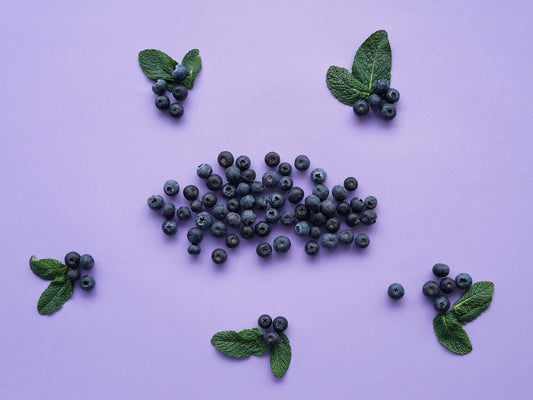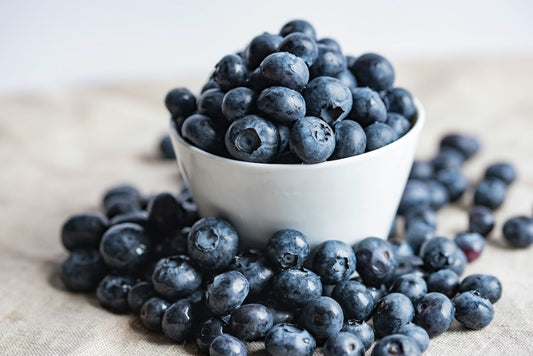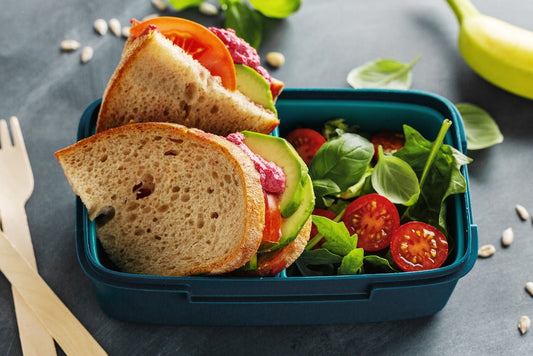When it comes to healthy digestion and a healthy gut, the microbiome is crucial. The microbiome is a collection of trillions of bacteria and other microorganisms (viruses, fungi, etc.) that live in our gut. They play an important role in the digestion of food, the utilization of food components and the maintenance of a strong immune system.
But what foods are good for our gut microbiome? In this article, we will look at some of the best options. We at Verival also have a few ideas for you on how you can boost your microbiome at breakfast time.
Prebiotic porridge for breakfast – find out more!
What is the microbiome and why is a healthy gut flora so important?
The microbiome – also known as the intestinal flora – is a complex community of bacteria, fungi and other microorganisms that live in our intestines.
These intestinal bacteria interact with each other and our body in complex ways to help us absorb nutrients from our food, regulate our digestion and support our immune system – that is, to successfully ward off pathogens. It is therefore very important to build a healthy intestinal flora.
The microbiota is clearly associated with inflammatory bowel disease, irritable bowel syndrome and ulcerative colitis. But it is also associated with allergies, atopic dermatitis, obesity, diabetes, depression and even dementia. According to microbiome research, a healthy composition of the microbiome is therefore immensely important not only for the human gut itself but also for our overall health.
Why is food important for our gut microbiome?
Food can have a major impact on the health and balance of microbes. The type of food we eat can significantly influence the growth and activity of certain types of bacteria in the gut – for better or for worse!
A balanced diet with lots of fiber-rich foods, fermented foods, prebiotic foods, and foods with polyphenols is therefore crucial and is recommended by nutritionists. This is because such foods provide important nutrients for the healthy bacteria in the gut and can thus promote the growth and activity of these bacteria.
Some influencing factors can significantly disturb the balance of the microbiome. For example, an unhealthy diet with too many refined carbohydrates – large amounts of sugar disturb the intestinal flora. Likewise, a lack of fiber-rich foods, stress and the intake of antibiotics always put a strain on the healthy bacterial strains.
These factors can therefore lead to problems such as digestive disorders, chronic inflammation, intestinal diseases and even depression. A change in diet and a conscious choice of food can help to restore the balance of the microbiome and improve overall digestion and health.
The right diet supports the intestinal bacteria and thus your intestinal health.
At Verival, we can help support your gut microbiome at breakfast time. A prebiotic blueberry-raspberry porridge, for example, will keep your gut healthy from the moment you sit down at the table.
There are many foods that can support the microbiome and thus promote digestive and immune health. These foods are high-fiber foods, fermented foods, prebiotic foods and foods with polyphenols. Here are the benefits of these foods in more detail:
High-fiber foods
Dietary fiber is a type of indigestible carbohydrate found in many plants. They are particularly important for the microbiome as they provide food for the healthy bacteria in the gut. When fiber is digested, short-chain fatty acids are produced that nourish the good gut bacteria.
Some of the best high-fiber foods include:
- Whole grains such as whole wheat bread, brown rice, and oats
- Fruits like apples, bananas, and berries
- Vegetables like broccoli, brussels sprouts, and sweet potatoes
- Legumes like beans, lentils, and chickpeas
Probiotics – Fermented Foods
Fermented foods are an excellent source of probiotic bacteria that can support the microbiome. Some of the best fermented foods and natural probiotics include:
- Fermented milk products (natural yoghurt, sour milk, kefir,...)
- Sauerkraut
- Kimchi
- Kombucha
- Tempeh
Prebiotic foods
Prebiotics are food sources for probiotic bacteria and can help to promote the growth and activity of these bacteria in the gut. Some of the best prebiotic foods are:
- Garlic
- Onions
- asparagus
- artichokes
- bananas
- chicory
- Jerusalem artichoke
All about prebiotics – find out how to incorporate prebiotics into your breakfast with Verival.
Prebiotic foods – find out more!
Foods with polyphenols
Polyphenols are phytochemicals and antioxidants. These plant substances can reduce inflammation in the intestines and have a positive effect on complaints such as irritable bowel syndrome, Crohn's disease, etc. Some of the best polyphenol-rich foods are:
- Berries such as blueberries and raspberries
- Dark chocolate
- Nuts such as walnuts and almonds
- spices like turmeric and ginger
Here are 7 more top microbiome-friendly foods that should not be missing from your diet:
Yogurt:
Yogurt is a fermented food that contains beneficial bacteria such as Lactobacillus and Bifidobacterium. These bacteria can help promote intestinal balance and reduce inflammation.
Whole grain products:
Whole grains are high in fiber, which can promote the growth of beneficial bacteria in the gut. These include whole wheat bread, whole wheat pasta, brown rice, and oatmeal.
Garlic:
Garlic contains inulin, a prebiotic fiber that can promote the growth of beneficial bacteria in the gut. In addition, garlic contains sulfur-containing compounds that can reduce inflammation.
Sauerkraut:
Sauerkraut is a fermented vegetable that contains beneficial bacteria such as Lactobacillus. These bacteria can help promote balance in the gut and strengthen the immune system.
Blueberries:
Blueberries are rich in polyphenols, plant compounds that can reduce inflammation and promote the growth of beneficial bacteria in the gut.
Kefir:
kefir is a fermented milk product that contains a variety of beneficial bacteria and yeasts. It can help to promote intestinal balance and improve digestion.
Flax seeds:
flax seeds are high in fiber and can help promote the growth of beneficial bacteria in the intestines. They can also help to regulate the stool and improve digestion.
By eating these foods regularly, you can keep your intestinal flora in good shape!
How to incorporate microbiome-friendly foods into a healthy diet?
At Verival, we can help you strengthen your intestinal microbiome or gut flora from the moment you wake up with our selected porridges and mueslis.
Verival blueberry-raspberry prebiotic porridge:
This porridge contains valuable prebiotic fibers from chicory inulin, Jerusalem artichoke, chia seeds and psyllium husks and is ready to eat in just 3 minutes. Discover our prebiotic porridge.
If you want to support your gut flora with the right food choices, there are some simple tips to help you integrate microbiome-friendly foods into your meals:
- Start small: Begin by adding small amounts of microbiome-friendly foods to your meals and gradually increase the amount until you get used to it.
- Experiment with different foods: Try out different microbiome-friendly foods to see which you like best and which are easiest to incorporate into your diet.
- Plan ahead: Plan ahead and prepare meals that contain microbiome-friendly foods to ensure you get enough of them in your diet.
Here are three recipe ideas that include microbiome-friendly ingredients:
- Yogurt bowl: Mix Greek yogurt with flax seeds, blueberries and walnuts for a healthy and nutritious breakfast.
- Sauerkraut salad: Mix chopped sauerkraut with carrots, apples and beetroot for a tasty and healthy salad.
- Kefir smoothie: blend kefir with frozen berries, banana and spinach for a refreshing and nutritious smoothie.
Incorporating microbiome-friendly foods into your diet can be easy if you follow a few simple tips and try out creative recipe ideas. By adding these foods to your meals, you can improve your gut health and overall well-being.
Prebiotic porridge breakfast – discover it now!
Oat yoghurt bowl:
Here you will find a great recipe idea with oats from Verival that supports the microbiome:
Ingredients:
- 1/2 cup rolled oats
- 1 cup Greek yoghurt
- 1/2 cup berries (e.g. blueberries, raspberries or strawberries)
- 1 tbsp flaxseed
- 1 tbsp honey
Preparation:
- Put the oats in a bowl and cover with water. Let them soak overnight in the fridge.
- The next morning, pour the yogurt over the oats.
- Sprinkle the berries on top of the yogurt and garnish with flaxseed and honey.
- Mix well and enjoy!
This oatmeal yogurt bowl is a quick and easy way to incorporate microbiome-friendly foods into your diet. Oatmeal is high in fiber, which promotes the growth of good bacteria in the gut, while yogurt and berries have probiotic properties. Flaxseeds are rich in omega-3 fatty acids and can also contribute to microbiome health.
Which foods are harmful to the microbiome?
There are some foods that are particularly harmful to the microbiome and can cause disrupted intestinal flora. As mentioned above, these include sugary foods, processed foods and alcohol. Alcohol can disrupt the balance of bacteria in the gut and promote inflammation. Excessive consumption can significantly increase the risk of bowel cancer and the risk of leaky gut syndrome. Processed foods are also high in sugar, salt, and unhealthy fats. Sugar promotes the growth of unwanted bacteria in the gut, disrupting the balance.
It is important to note that not all foods affect everyone the same way. Everyone has an individual microbiome that can react to different foods. For example, some people may be more sensitive to certain foods than others. However, it is generally recommended to reduce the consumption of sugary foods, processed foods, and alcohol to promote microbiome health.
Conclusion
In summary, a balanced diet plays an important role in maintaining a healthy gut microbiome. Foods that support the microbiome are those that are high in fiber and probiotics. It is important to incorporate microbiome-friendly foods into your diet by eating more vegetables and fruits and avoiding processed foods, sugar, and alcohol.
Prebiotic Porridge Breakfast - discover it now!
FAQ's:
Can you improve your microbiome through diet?
Yes, a balanced diet can improve the microbiome and keep it healthy. A diet rich in microbiome-friendly foods such as yogurt, sauerkraut, kefir, flaxseed, and high-fiber foods such as vegetables and fruits promotes the diversity and number of beneficial bacteria in the gut.
Are probiotic foods better for the microbiome than supplements?
Probiotic foods are generally better for the microbiome than supplements because they are natural sources of beneficial bacteria and other microorganisms. Probiotic foods such as yogurt and kefir contain live cultures of lactic acid bacteria and bifidobacteria that can directly affect the microbiome. However, dietary supplements can also be effective if they contain high-quality strains of beneficial bacteria. Especially for a complete gut cleanse (e.g. after a prolonged course of antibiotics), dietary supplements can be helpful.
How much microbiome-friendly food should you eat?
There is no specific recommendation for the amount of microbiome-friendly foods one should eat. However, a balanced diet with a variety of healthy foods is best. It is recommended to eat at least 2-3 servings of fermented foods such as yogurt, sauerkraut, or kefir daily to support the microbiome.
Are gluten-free foods better for the microbiome?
There is no clear evidence that gluten-free foods are better for the microbiome than other foods. However, people with celiac disease or gluten intolerance must consume gluten-free foods to maintain their health. If you don't have celiac disease or gluten intolerance, it's important to consume a balanced diet with a variety of foods to promote a healthy microbiome.
Frequently asked questions
How can I build up my microbiome?
Regular consumption of the following foods will keep your intestinal flora in good shape: yogurt, whole grain products, oatmeal, garlic, sauerkraut, blueberries, kefir, and flaxseed. They will help you keep your microbiome healthy. A sufficient amount of probiotics in combination with prebiotics will strengthen your intestinal flora. Prebiotics are food sources for probiotic bacteria and can help promote the growth and activity of good bacteria in the gut. Some of the best prebiotic foods are: garlic, onions, asparagus, artichokes, bananas, chicory and Jerusalem artichokes.
What is a gut microbiome?
The gut microbiome refers to the collection of microorganisms in the human gut. Another, somewhat older term for this is “gut flora”. The microbiome includes bacteria, viruses and fungi.
What does the gut like?
The human gut needs fresh and unprocessed food to stay healthy. Food can have a major impact on the health and balance of microbes. The type of food we eat can significantly influence the growth and activity of certain types of bacteria in the gut - for better or for worse! A balanced diet with plenty of fiber-rich foods, fermented foods, prebiotic foods, and foods with polyphenols is recommended by nutritionists.
What breakfast to eat during intestinal cleansing?
To do something good for your gut, a warm breakfast porridge made from oats is particularly suitable in the morning. To make it, oats are cooked in water or milk until creamy and then refined with fruit, spices, seeds or nuts. This dish is good for your intestinal mucosa and promotes the growth of good bacteria in your gut.
























